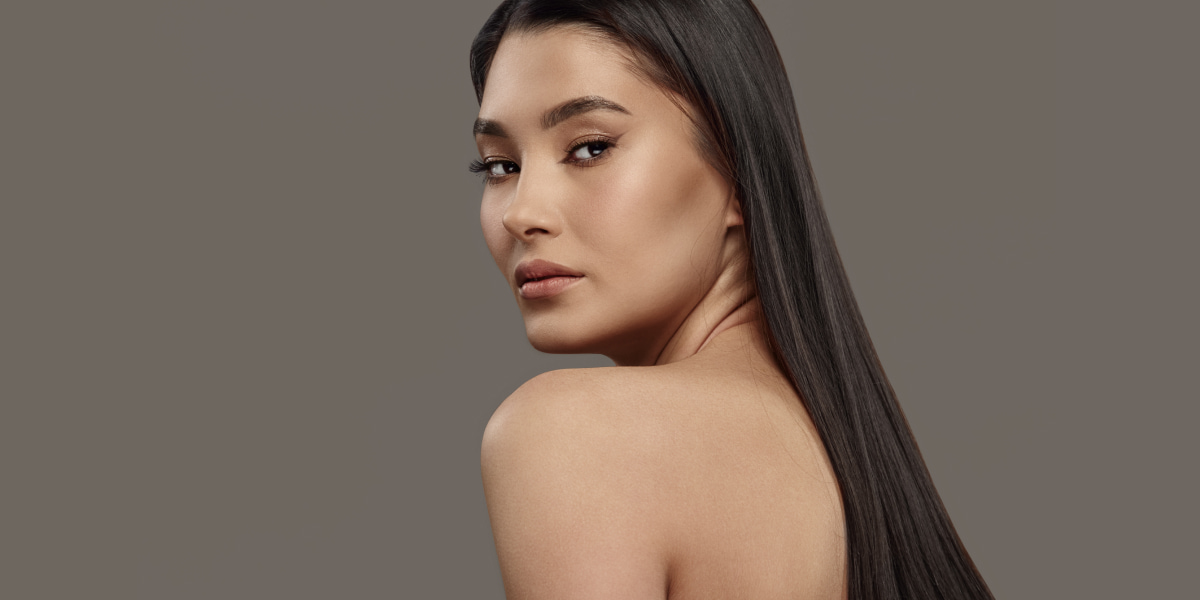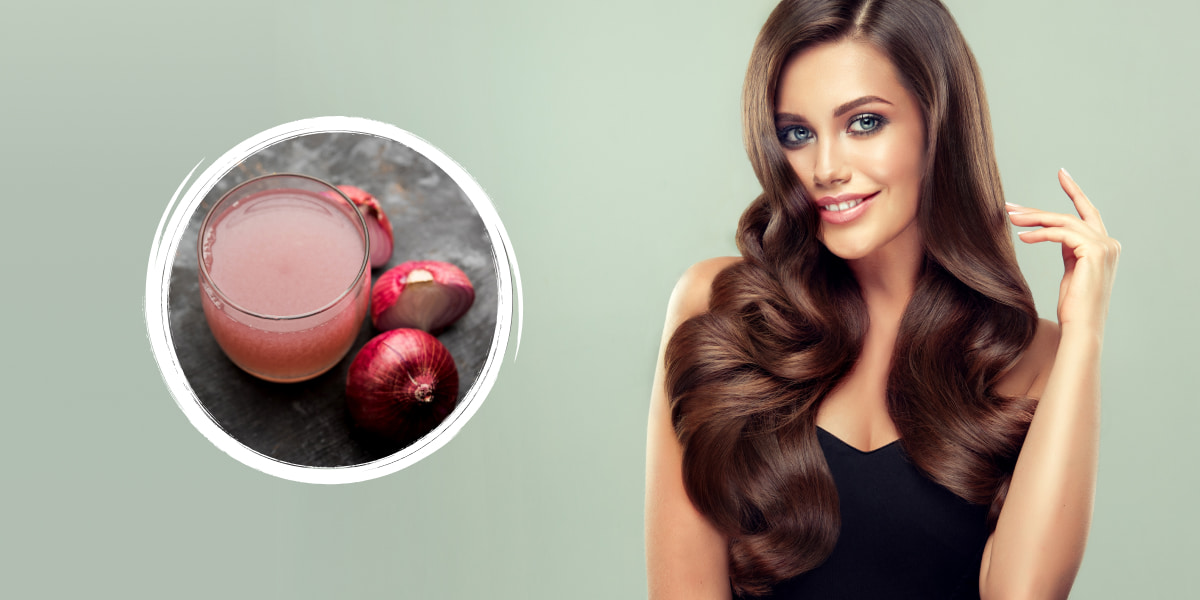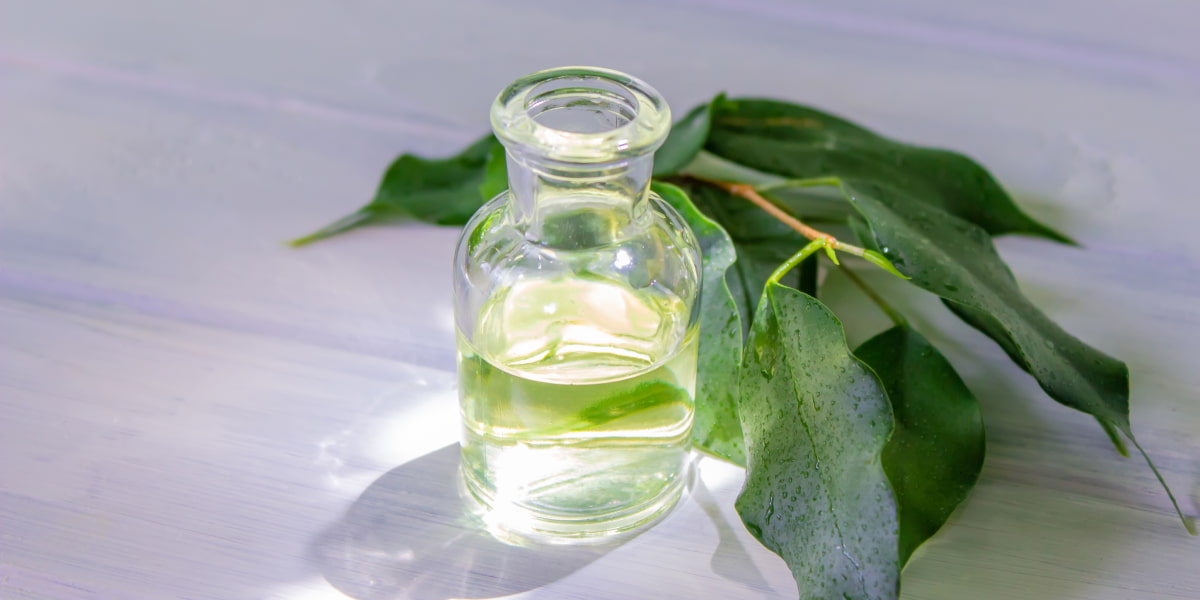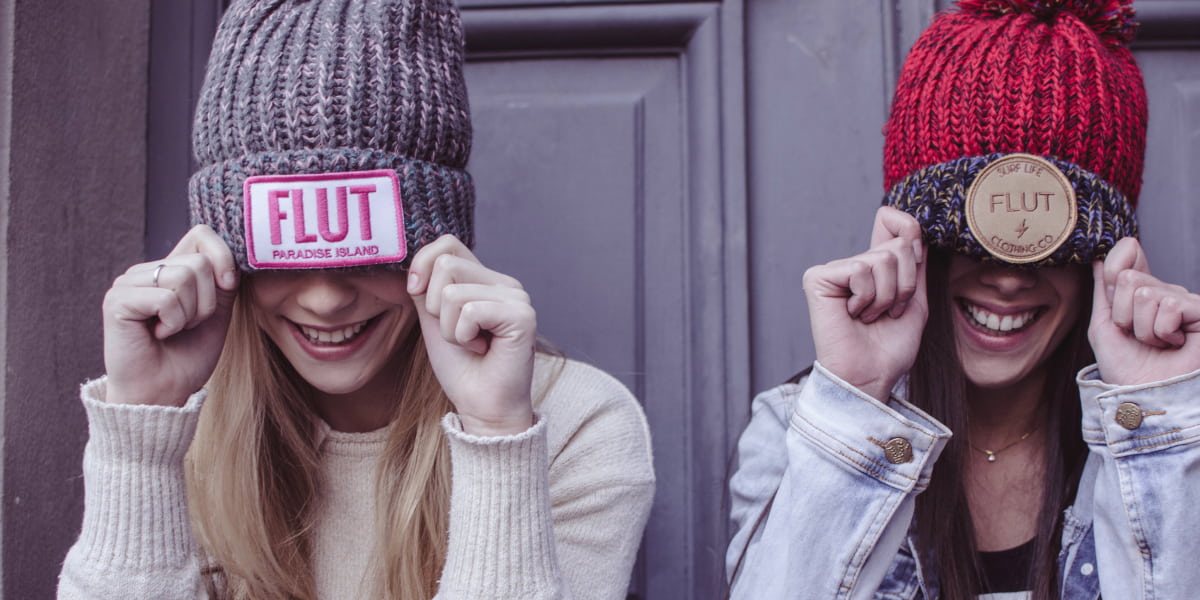Published on September 19th, 2023
Last updated on September 19th, 2023
Hibiscus For Hair: Benefits and Uses
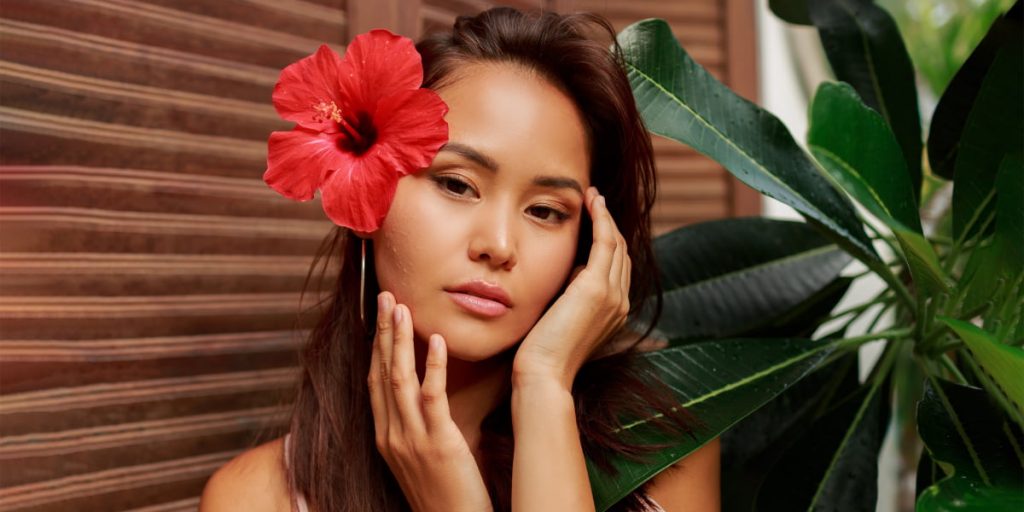
Hibiscus is a flowering plant known for its vibrant colors and beauty. It has been used for centuries for its medicinal and therapeutic properties. Hibiscus is rich in:
- Vitamins;
- Minerals;
- And antioxidants.
These properties provide a wide range of benefits for hair health. They can improve:
- Your overall hair health;
- And your hair appearance.
Its natural properties can help strengthen:
- Hair strands;
- Prevent breakage;
- Restore shine;
- And moisture to dry and damaged hair.
Additionally, hibiscus for hair has anti-inflammatory properties that can:
- Soothe the scalp;
- Reduce dandruff;
- And prevent scalp infections.
If you’re looking for a natural and effective way to improve the health and appearance of your hair, then hibiscus flowers could be the answer.
In this guide, we will explore hibiscus’s various benefits and uses for hair care. From promoting hair growth to preventing dandruff, hibiscus flowers have a lot of properties that can benefit all hair types.
Hibiscus Benefits For Hair
Hibiscus is a natural ingredient with many benefits for hair including:
- Promoting hair growth;
- Preventing hair loss;
- Strengthening hair;
- Conditioning hair;
- And fighting dandruff.
Hibiscus leaves can also be useful for hair care. They contain natural saponins that can help cleanse and condition the scalp.
Hibiscus is native to many tropical and subtropical regions worldwide, including:
- Asia;
- Africa;
- the Caribbean;
- South America.
Some major producers of hibiscus for hair include India, Egypt, Sudan, and Thailand. However, hibiscus can grow in many other countries with suitable climatic conditions.
In India, hibiscus has been a traditional hair care practice for centuries, with women:
- Grinding the flowers into a paste;
- Applying it to their hair to promote growth and shine.
Hibiscus is a common ingredient in many natural hair care products, including:
- Shampoos;
- Conditioners;
- And hair masks.
According to a survey conducted by Nielsen, the global market for hair care products grew from $9.99 billion in 2022 to $10.79 billion in 2023, with a growing demand for natural and organic products.
Besides its benefits for hair, hibiscus is also used in traditional medicine to treat a range of ailments:
- High blood pressure;
- Fever;
- And digestive issues.
Hibiscus is often referred to as the “Botox plant.” It is due to its ability to improve skin elasticity and reduce the appearance of wrinkles. Here is a more detailed list of its benefits:
Promotes Hair Growth

Hibiscus has several properties for promoting hair growth:
- It contains essential vitamins and minerals, including Vitamin C and iron, that:
– nourish hair follicles;
– stimulate hair growth.
- It is rich in antioxidants. It protects hair from damage caused by free radicals, which can lead to:
– hair fall;
– and hair thinning.
Prevents Hair Loss
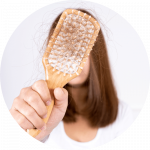
Hibiscus is a potent natural ingredient that can help prevent hair loss:
- Vitamin C helps increase collagen production. It is necessary for healthy hair growth. This, in turn, strengthens the hair roots and reduces hair fall.
- Hibiscus contains amino acids that nourish the hair and scalp:
– promoting healthy hair growth;
– and preventing hair loss.
Strengthens Hair
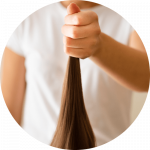
Hibiscus is an excellent natural ingredient for strengthening hair:
- Hibiscus has natural conditioning properties that help to hydrate and moisturize the hair. It makes it less prone to breakage and damage.
- It also balances the pH levels of the scalp. It prevents scalp conditions that can lead to hair loss and weakened hair.
Fights Dandruff
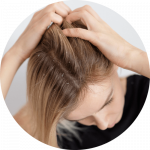
Hibiscus is a natural ingredient that can help fight dandruff and other scalp conditions:
- It has natural antifungal and antibacterial properties. It helps prevent the growth of fungi and bacteria on the scalp, which can contribute to dandruff.
- Hibiscus has natural astringent properties that reduce excess oil production on the scalp. Since it is a common cause of dandruff.
- Regular use of hibiscus can prevent dandruff and other scalp issues.
Makes Hair Shiny
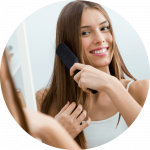
Hibiscus contains natural mucilage, which is a slimy substance. It is one of the most significant hibiscus benefits for hair. It acts as a natural conditioner for hair. This mucilage helps:
- Coat the hair strands;
- And smooth down the hair cuticles.
And it results in a shiny hair appearance.
Acts as a Natural Hair Dye
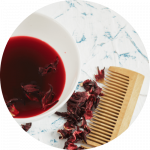
Hibiscus flowers contain natural pigments that can act as a natural hair dye. When used on hair, the pigments can create a reddish tint. It depends on the hair’s natural color.
To use hibiscus as a natural hair dye, you need to:
- Boil the flowers in water to create a concentrated liquid;
- Then apply it to the hair.
The longer the liquid is on the hair, the more intense the color. But, it’s important to note that hibiscus can not provide the same level of coverage as chemical hair dyes. And the color fades over a little time.
Hibiscus Uses For Hair
Hibiscus can be useful in various forms, such as:
- Hair masks;
- Shampoos;
- Hair rinses;
- And hair oils.
There are different methods of using hibiscus for hair. And choosing the right one depends on your hair concerns and personal preferences. Let’s consider what method to choose from different hibiscus uses for hair:
| Hair Mask | It can be an excellent option for dry, damaged, or frizzy hair. |
| Shampoo | A hibiscus-infused shampoo can be a good option to cleanse your scalp and promote healthy hair growth. Look for a natural shampoo that contains hibiscus extract. You can make your own by mixing hibiscus powder with your regular shampoo. |
| Hair Rinse | It helps hydrate and detangle your hair. |
| Hair Oil | It helps nourish and strengthen your hair. |
Overall, choosing the proper method depends on your hair concerns and preferences. Experiment with different ways. And you can find the one that:
- Works best for your hair type;
- And addresses your specific hair concerns.
Let’s consider the hibiscus uses for hair in more detail:
Hibiscus Oil
Hibiscus oil is made by infusing hibiscus flowers in a carrier oil, such as:
- Coconut;
- Or jojoba oil.
You can use this oil as a pre-shampoo treatment to:
- Nourish;
- And strengthen hair.
You can also use it as a leave-in conditioner to add moisture and shine.
To use hibiscus oil, you need to:
- Apply it directly to the scalp and hair;
- Or mix it with coconut or jojoba oil for added benefits.
Hibiscus Hair Mask
For this hibiscus uses for hair, you need to:
- Mix hibiscus powder or crushed hibiscus flowers with other natural ingredients such as:
– yogurt;
– honey;
– or coconut oil.
- Apply the mixture to the hair and scalp;
- Leave it on for 30-45 minutes, then rinse off thoroughly.
Regularly using this mask can help promote:
- Healthier;
- And more beautiful hair.
Hibiscus Tea Rinses
Hibiscus tea rinses can also enhance the hair’s natural color. And it can be useful, particularly for those with dark hair. It can provide a subtle red tint.
To use a hibiscus tea rinse for your hair, you need to:
- Brew hibiscus tea using dried hibiscus flowers or hibiscus tea bags;
- Let it cool;
- Then pour it over the hair and scalp after shampooing;
- Massage the scalp for a few minutes;
- Then rinse off thoroughly with cool water.
Hibiscus Shampoo and Conditioner
Hibiscus shampoo and conditioner contain natural ingredients derived from the Hibiscus plant. Hibiscus shampoo can:
- Cleanse the hair gently and scalp;
- And be suitable for healthy hair growth.
Hibiscus conditioner helps hydrate and nourish the hair, leaving it:
- Smooth;
- And shiny.
The plant extracts in the conditioner help:
- Detangle the hair;
- Reduce frizz;
- And make it easier to manage.
Both the shampoo and conditioner are free from harmful chemicals such as:
- Sulfates;
- Parabens;
- And phthalates.
This makes them safe for all hair types, including color-treated hair. Hibiscus shampoo and conditioner are a great choice for those looking for:
- Natural;
- Effective hair care solutions.
Hibiscus-infused Hair Water
This method of hibiscus use for hair is a natural hair care product. It is gaining popularity in the beauty industry.
You can make the hibiscus-infused hair water with:
- Steeping hibiscus flowers in water;
- And using the resulting infusion as a refreshing mist for hair.
This mist can help:
- Soothe an itchy scalp;
- Add shine;
- And improve hair texture.
Hibiscus Powder for Hair
This powder is a popular natural hair care ingredient. It is rich in vitamins and minerals that are essential for healthy hair. It includes:
- Vitamin C;
- Iron;
- And antioxidants.
It is also a natural source of alpha-hydroxy acids. They help exfoliate the scalp and promote healthy hair growth. It is made by grinding dried hibiscus flowers into a fine powder.
To use hibiscus powder for hair:
- You can mix it with water, coconut, or olive oil to form a paste. This paste can be:
– applied to the hair;
– and left on for 30-60 minutes before rinsing off.
- You can also add it to your favorite shampoo or conditioner. It can boost hair-nourishing properties.
Which Color Hibiscus Flower Is Good For Hair?
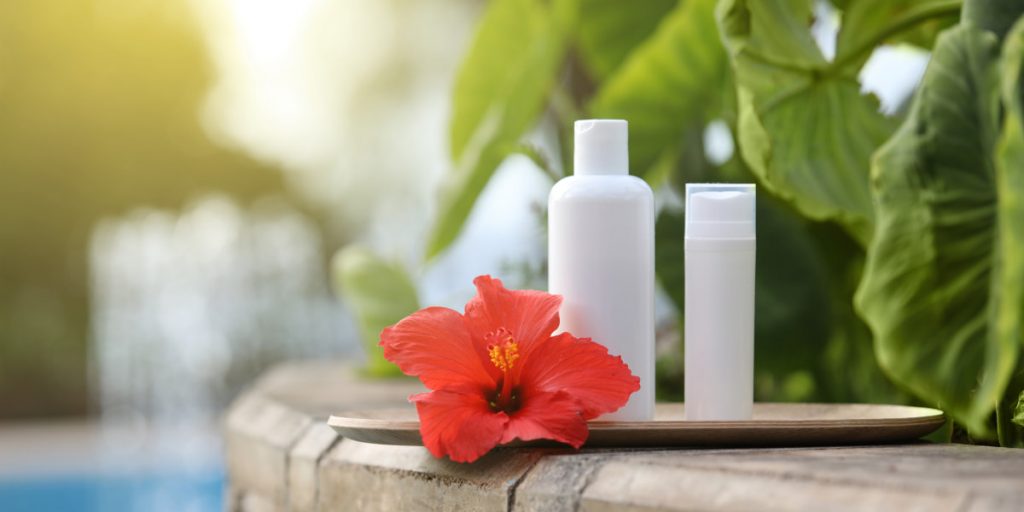
Hibiscus flowers come in various colors, including red, pink, yellow, and white. All colors are good for hair. However, red hibiscus flowers can be particularly effective for hair care.
Red hibiscus flowers contain high levels of anthocyanins, which are powerful antioxidants. These antioxidants can help:
- Protect hair follicles from damage;
- And promote healthy hair growth;
- Neutralize free radicals, which can damage:
– hair cells;
– and lead to hair loss and thinning.
In addition to their antioxidant properties, red hibiscus flowers are also rich in:
- Vitamins;
- Minerals;
- And amino acids.
These nutrients can help:
- Nourish and strengthen hair;
- Prevent breakage;
- And improve hair texture and shine.
Pink, white, and yellow hibiscus flowers also have benefits for hair, such as:
- Flavonoids;
- And mucilage.
They can help nourish and condition hair. Pink hibiscus flowers, for example, contain high levels of vitamin C. It can help boost collagen production and promote healthy hair growth.
White hibiscus flowers contain natural emollients that help moisturize and soften hair.
Ultimately, the color of the hibiscus flower you choose for your hair care will depend on:
- Your personal preference;
- And availability.
Bottom Line
Hibiscus is a versatile and natural ingredient with many benefits for hair. It is a wonderful addition to your hair care regimen. Not only is it natural and safe, but it can also help you achieve healthy and beautiful hair. Hibiscus is great for hair growth. So why not try and experience the fantastic benefits of hibiscus for yourself?
FAQ
Can I leave hibiscus in my hair?
Yes, you can leave hibiscus in your hair as:
– a leave-in treatment;
– or use it as an ingredient in your conditioner or hair mask.
Leave it in for about 30 minutes to an hour, then rinse it with water.
Can we apply hibiscus to hair daily?
Using hibiscus on your hair daily is safe if it doesn’t cause allergic reactions or irritation. But, it’s important to note that excessive use can cause dryness or brittle hair. So moderation is key.
Can I boil hibiscus flowers for hair?
Yes, you can boil hibiscus flowers for hair to make a natural hair rinse or tea. Boil a few hibiscus flowers in water for a few minutes, and let the mixture cool. And then, strain out the flowers before using the liquid as a hair rinse.
How do you make hibiscus oil for hair?
You can infuse hibiscus flowers in a carrier oil such as coconut or olive oil to make hibiscus oil. Heat the mixture on low heat for several hours, then strain and use the oil as a hair treatment.
Can hibiscus cause any side effects on hair?
Hibiscus is generally safe for use on the hair. But it can cause side effects such as:
– scalp irritation;
– or allergic reactions in some individuals.
It is advisable to perform a patch test before using hibiscus on hair.
Can hibiscus be used on color-treated hair?
Yes, you can use it on color-treated hair. It is a natural ingredient that can:
– provide nourishment;
– and promote healthy hair growth.
How long does it take to see the effects of hibiscus on hair?
The effects depend on the individual’s hair type and the frequency of use. Generally, it can take a few weeks to notice the benefits of hibiscus on hair.
Are there any precautions to take when using hibiscus on hair?
Avoid getting it in the eyes or mouth when using hibiscus on hairl. It is also advisable to use fresh hibiscus flowers or pure hibiscus powder rather than products that contain synthetic additives.


